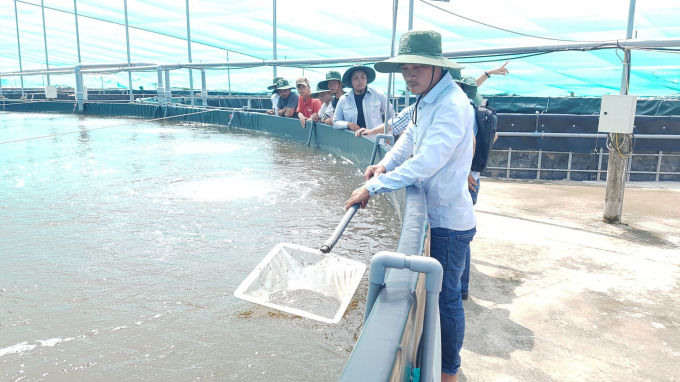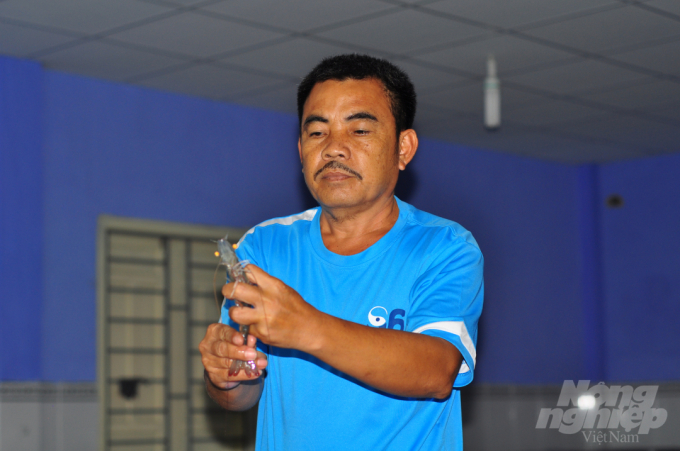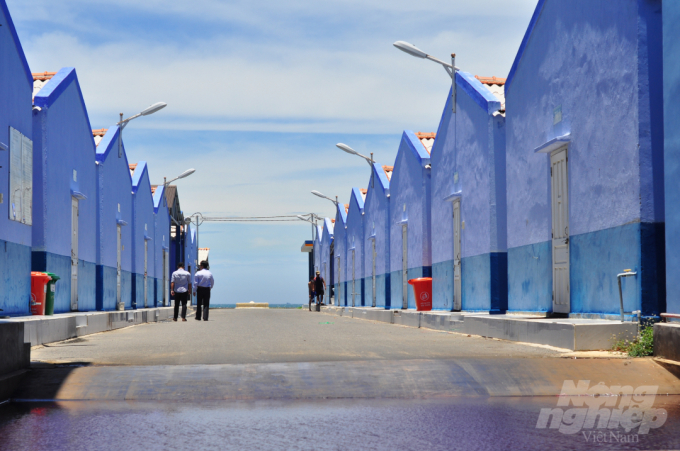May 20, 2025 | 19:27 GMT +7
May 20, 2025 | 19:27 GMT +7
Hotline: 0913.378.918
May 20, 2025 | 19:27 GMT +7
Hotline: 0913.378.918

The shrimp market is adjusting as shrimp farms in the Mekong Delta provinces reduced production
With favorable climate conditions and clean seawater, Ninh Thuan is the largest center of shrimp production in the country. Nguyen Khac Lam, Deputy Director of Ninh Thuan Department of Agriculture and Rural Development, states that the province currently has 450 production facilities, in 2020 alone, the province has produced nearly 43 billion shrimps, accounting for 35% of the country's production, consisting mainly of black tiger shrimp and white leg shrimp.
Over 90% of Ninh Thuan's shrimp consumption is in the Cuu Long Delta provinces, due to the complicated situation of the Covid-19 pandemic and the southern localities implementing social distancing in accordance with Directive 16 by the Prime Minister, local shrimp production and consumption are affected.

Ninh Thuan has about 450 shrimp production facilities and provides nearly 43 billion shrimp per year to the market. Photo by: Minh Hau.
Mr. Le Van Que, Chairman of Ninh Thuan Aquaculture Breeding Association, a shareholder of S6 Investment JSC, states that pandemic prevention work is now essential to return everyday life to normal. The Association also recommends businesses to try to arrange production, actively negotiate with customers and farming households to avoid damage. The problem of inputs and animal feed is difficult, so businesses must "adapt", come up with appropriate solutions.
“The transportation of shrimps is ongoing, but due to the pandemic, it is more difficult than before. Currently, shrimp transporting trucks are still allowed to travel, but it is more difficult due to the high cost, drivers must be tested for Covid-19... ", Mr. Lam adds that regarding the shrimps, it takes about 1 month from incubation to marketable period. In case the shrimp does not ship out on time, the litter must be discarded.
Mr. Le Van Que, Chairman of Ninh Thuan Aquaculture Breeders Association, said that shrimp production facilities are facing difficulties, which are the source of feed for shrimp imported from other localities such as Ho Chi Minh City, Hanoi, etc. The transportation of feed faces many difficulties due to different regulations in each regulation. Shrimp production facilities are short on labor for shrimp production and packaging due to social distancing regulations, shrimp export and sale is also difficult due to transportation.
According to Mr. Le Van Que, when 12 provinces in the Mekong Delta implemented social distancing according to Directive 16, it was difficult to transport shrimp to these localities, but has since been easier.
“Currently, shrimp production facilities are gradually removing obstacles in transportation. According to local regulations, shrimp hatcheries in the area must ensure "3 in places", so when the drivers return, they must stay at the production site without going home and they don't have to quarantine for 14 days, if there are goods, they will continue to ship them as long as they have a negative test certificate," said Mr. Le Van Que.

Due to the Covid-19 pandemic, transportation and ancillary services are halted, affecting shrimp production. Photo by: Minh Hau.
Currently, Mr. Le Van Que is a shareholder of S6 Investment Joint Stock Company (an enterprise operating in the field of aquaculture in Ninh Thuan). With a large production scale, each year, this company provides about 2 billion shrimps to regions across the country.
With the complicated development of the Covid-19 pandemic, the enterprise has adjusted its production to about 1 billion shrimps this year and production is still ongoing as usual.
Mr. Huynh Minh Khanh, Deputy Director of the Ninh Thuan Provincial Sub-Department of Livestock and Veterinary Medicine, said that due to the epidemic situation, services such as animal feed, transport vehicles, employees, and laborers pay for services. shrimp, market… are all challenging. In the past, Ninh Thuan had about 200-300 trucks each day transporting shrimp to the most consuming provinces in the south, but now there are only more than 80 trucks per day.

S6 Investment JSC is currently reducing its shrimp production capacity due to the Covid-19 pandemic. Photo by: Minh Hau.
Mr. Huynh Minh Khanh also states that in the past, due to difficulties in transportation and social distancing, many localities also release shrimps less than every year, leading to congestion in locally produced shrimps. And because transportation is not possible, post shrimp exceeded the standards so customers refuse to buy them, forcing producers to abandon them.
Regarding the issue of post shrimp exceeding the standard for not being able to timely transport to the place of consumption, Mr. Le Van Que said that the Ninh Thuan Aquaculture Breeding Association also recorded several cases. According to Mr. Que, in the past, shrimps that were too old to be sold to farming ponds could still be sold in markets in some provinces such as Bac Lieu and Ca Mau to provide breed for extensive farmers. However, presently, markets like this are closed due to the pandemic, so shrimps that are too old cannot be consumed and have to be discarded.
Mr. Truong Khac Tri, Director of Ninh Thuan Animal Husbandry and Veterinary Sub-Department: Immediately after the southern provinces implemented social distancing according to Directive 16, the transportation and circulation of goods in general and specifically shrimps face difficulties. In order to cope with difficulties in the circulation of shrimps, we contacted the Animal Husbandry and Veterinary Sub-Department of partnered units with vehicles passing through, for shrimp farming facilities we actively direct, if there are any problems, at any point, they will be solved together. So far, it is generally more stable, transportation is more convenient. Regarding the quantity of quarantined shrimp for export to the localities at this time, the decrease is due to the general situation of the pandemic as well as local farmers reducing production.

(VAN) Khanh Hoa is investing over 545 billion VND to develop 240 hectares of high-tech marine aquaculture in order to guarantee a consistent supply of seafood exports and achieve the USD 1 billion target.

(VAN) Minister of Agriculture and Environment Do Duc Duy held a meeting with Soopakij Chearavanont, Chairman of C.P. Group, on May 15.
/2025/05/16/3800-0-nongnghiep-143756.jpg)
(VAN) Suntory PepsiCo Vietnam coordinated with the Ministry of Education and Training to implement an education program on water conservation, reaching nearly 1 million primary school students nationwide.

(VAN) Vietnam’s TH Group officially put its high-tech fresh milk processing plant into operation in the Russian Federation, marking a historic moment as the first TH true MILK cartons were produced in Russia.

(VAN) Use of high-quality broodstock and biotechnology is regarded as the most effective approach to ensuring sustainable and economically viable shrimp aquaculture ahead of climate change and the emergence of increasingly intricate disease patterns.

(VAN) Carbon farming is a form of agricultural practices that helps absorb more greenhouse gases than it emits, through smart management of soil, crops, and livestock.

(VAN) This is a key content of the Memorandum of Understanding recently signed between the Vietnam Fisheries Society and Kunihiro Inc of Japan.